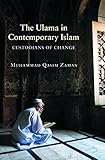The Ulama in Contemporary Islam : Custodians of Change.
Material type: TextSeries: Princeton Studies in Muslim Politics SerPublisher: Princeton : Princeton University Press, 2007Copyright date: ©2002Description: 1 online resource (312 pages)Content type: text Media type: computer Carrier type: online resourceISBN: 9781400837519Subject(s): Muslim scholars | UlamaGenre/Form: Electronic books.Additional physical formats: Print version:: The Ulama in Contemporary Islam : Custodians of ChangeDDC classification: 297.6/1 LOC classification: BP185 -- .Z36 2002ebOnline resources: Click to View
TextSeries: Princeton Studies in Muslim Politics SerPublisher: Princeton : Princeton University Press, 2007Copyright date: ©2002Description: 1 online resource (312 pages)Content type: text Media type: computer Carrier type: online resourceISBN: 9781400837519Subject(s): Muslim scholars | UlamaGenre/Form: Electronic books.Additional physical formats: Print version:: The Ulama in Contemporary Islam : Custodians of ChangeDDC classification: 297.6/1 LOC classification: BP185 -- .Z36 2002ebOnline resources: Click to View Cover -- CONTENTS -- FOREWORD -- ACKNOWLEDGMENTS -- Introduction -- I: Islamic Law and the 'Ulama in Colonial India: A Legal Tradition in Transition -- II: Constructions of Authority -- III: The Rhetoric of Reform and the Religious Sphere -- IV: Conceptions of the Islamic State -- V: Refashioning Identities -- VI: Religiopolitical Activism and the 'Ulama: Comparative Perspectives -- Epilogue: The 'Ulama in the Twenty-First Century -- NOTES -- GLOSSARY -- A -- B -- D -- F -- H -- I -- J -- K -- M -- P -- Q -- R -- S -- T -- U -- W -- Z -- BIBLIOGRAPHY -- INDEX -- A -- B -- C -- D -- E -- F -- G -- H -- I -- J -- K -- L -- M -- N -- P -- Q -- R -- S -- T -- U -- W -- Z.
From the cleric-led Iranian revolution to the rise of the Taliban in Afghanistan, many people have been surprised by what they see as the modern reemergence of an antimodern phenomenon. This book helps account for the increasingly visible public role of traditionally educated Muslim religious scholars (the `ulama) across contemporary Muslim societies. Muhammad Qasim Zaman describes the transformations the centuries-old culture and tradition of the `ulama have undergone in the modern era--transformations that underlie the new religious and political activism of these scholars. In doing so, it provides a new foundation for the comparative study of Islam, politics, and religious change in the contemporary world. While focusing primarily on Pakistan, Zaman takes a broad approach that considers the Taliban and the `ulama of Iran, Egypt, Saudi Arabia, India, and the southern Philippines. He shows how their religious and political discourses have evolved in often unexpected but mutually reinforcing ways to redefine and enlarge the roles the `ulama play in society. Their discourses are informed by a longstanding religious tradition, of which they see themselves as the custodians. But these discourses are equally shaped by--and contribute in significant ways to--contemporary debates in the Muslim public sphere. This book offers the first sustained comparative perspective on the `ulama and their increasingly crucial religious and political activism. It shows how issues of religious authority are debated in contemporary Islam, how Islamic law and tradition are continuously negotiated in a rapidly changing world, and how the `ulama both react to and shape larger Islamic social trends. Introducing previously unexamined facets of religious and political thought in modern Islam, it clarifies the complex processes of religious change unfolding in the
contemporary Muslim world and goes a long way toward explaining their vast social and political ramifications.
Description based on publisher supplied metadata and other sources.
Electronic reproduction. Ann Arbor, Michigan : ProQuest Ebook Central, 2018. Available via World Wide Web. Access may be limited to ProQuest Ebook Central affiliated libraries.

There are no comments on this title.